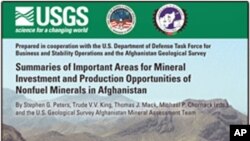A team of U.S. and Afghan officials and experts has just published new geological data that may speed up efforts to turn Afghanistan's vast mineral deposits into prosperity.
Experts have thought for years that Afghanistan has significant mineral deposits, including gold, copper, iron, rare earths and gems.
A new joint U.S.-Afghan project gives foreign investors and mining companies data that is more complete and more accurate.
The U.S. Geological Survey and its counterparts in the Afghan government reanalyzed old data, including information from the Soviet era, with more modern tools than were available when the data was collected decades ago.
The USGS also gathered huge amounts of new data from high-tech sensors on satellites and aircraft that peered deeply into most of Afghanistan's rugged and mountainous land. Ground teams examined promising areas in more detail. Team leaders have put all the project's data, thousands of pages of it, on a USGS website in the hope it will encourage companies to bid on projects.
USGS project chief Steve Peters says better information reduces the risk for investors and increases the likelihood that projects will get started.
"We think we have summarized what the potential is and we have provided enough data for private industry and the Ministry of Mines to move forward," said Peters.
Peters says some projects, such as gold mining, require relatively simple infrastructure and could get started in a year or so. Other efforts, like mining iron ore, need roads, power, and other kinds of infrastructure, which could take 10 years or more.
Worries about security could slow developments further.
But Afghanistan's ambassador to the United States, Eklil Hakimi, says the lure of profits will encourage companies to hurry up.
"As you know, people who want to make money, they do not want to wait," said Hakimi.
The Ambassador says the sooner companies get started, the sooner money and jobs can flow into Afghanistan's troubled economy.
"That is the ultimate goal, to make sure that this wealth that belongs to the people of Afghanistan, ultimately that they can get the benefit from it," he said.
He said it is crucial that a fair share of the profits go to ordinary people not just foreign companies or officials.
Experts: New Data Speeds Search For Afghanistan Minerals
